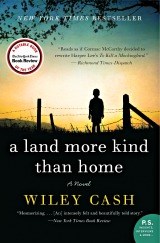MANCHESTER, N.H., Oct. 30, 2013 (GLOBE NEWSWIRE) -- Novelist Wiley Cash always found lots to do growing up in small-town Gastonia, North Carolina. There was a basketball hoop in the driveway and miles of woods, fields, and streams.
Rainy days could be slow, but not so much once he turned six and was issued his first library card. By then his mother had read aloud to him for years. And then this great building full of books was opened up to him.
"Early on I understood that life isn't just about the things you do," said Cash, who is a faculty member in Southern New Hampshire University's low-residency MFA in Fiction and Nonfiction program. "It's also about the things you think, and thinking is what reading gave me the time and the tools to do."
Perhaps it was the statue in the foyer of the library that made him think in particular about stories and the power they exerted. "The sculpture is of a person holding a book in his lap, reading it aloud to a younger person seated to his right," said Cash. "There was always something comfortable, familiar, and magical about that piece."
A good story is a public library's stock in trade, and in 2012 that's the reason why the Maine State Library and the Maine Library Association reacted as they did to the Pulitzer Prize committee's refusal to award any prize in fiction.
"Members of the library community, booksellers, publishers, authors, and avid readers were outraged with the indecisiveness of this prestigious group of judges," said Valerie Osborne of the Northeaster Maine Library District. "It was out of this frustration that the Maine Readers' Choice Award was born."
So a committee was formed of twenty librarians, booksellers, reviewers, and writers to survey the year's fiction offerings for "notable works of exceptional quality." Forty nominations were narrowed down to three finalists: "The Yellow Birds," by Kevin Brown (Little, Brown); "Gone Girl," by Gillian Flynn (Crown); and Cash's debut novel, "A Land More Kind Than Home" (HarperCollins).
By then Cash's dark-hued story—about a boy's death during an episode of snake-handling in a North Carolina Pentecostal Holiness Church—had already won a raft of other awards: New York Times Notable Book of 2012; Southern Independent Booksellers Alliance Best Fiction of 2012; PEN Robert W. Bingham Award Finalist for Debut Fiction; Strand Magazine Critics Award Finalist for Debut Fiction; Indies Choice Finalist for Debut Fiction; Library Journal Top Ten Book of 2012; Kirkus Reviews Best of 2012; and Crime Writers' Associations' Debut Novel of 2012.
Of course the other two novels were much decorated as well. The result might have been Pulitzer (or Congressional)-style gridlock were it not for direct democracy—a summer read-all-three-of-these-books campaign by Maine libraries, and then a month of online voting by Maine readers.
Last month Cash was announced as the winner of the first Maine Readers' Choice Award. "My book was in incredible company with 'Gone Girl' and 'The Yellow Birds,'" said Cash in his acceptance speech. "I have no idea how I was so fortunate to be invited to that party, but I was honored to be there. To be recognized by librarians and library patrons means a lot to someone who grew up in the public library system."
Of course an honor like this, the year's best stand-in for a Pulitzer, also means a lot to the graduate program in which Cash teaches fiction. "We know very well why Wiley was invited to that party," said Diane Les Becquets, herself an award-winning novelist and the director of Southern New Hampshire University's MFA program. "This first novel is a freight train of powerful, propulsive storytelling. We can't wait for his next."
That won't be long. Cash's second novel, "This Dark Road to Mercy," is scheduled for release in January, and in fact Cash has a library to thank for historical information on the murders that inspired the novel. "These are two girls, sisters, who had gone to my church and were both murdered by older boyfriends when I was fifteen," he said.
Cash couldn't remember their last names, and had spent years scouring the internet for a contemporary account. Then he went back to that public library in Gastonia for a reading of "A Land More Kind Than Home."
"It only took the reference librarian there about fifteen minutes," Cash said, "before I was looking at a microfiche of the two sisters' faces on the cover of the 'Gaston Gazette' on the day after their bodies were found covered in lime in a shallow grave at the foot of Crowder's Mountain."
Cash thanked the librarian effusively. "That's what we're here for," she said. "We love it when the internet isn't enough."
A library offers a different sort of memory from the internet, and also a different sort of inspiration. For the winner of the inaugural Maine Readers' Choice Award, it's sufficient unto itself: comfortable, familiar, magical.
"All the things I remember," Cash said, "all the things I've forgotten, and all the things I want to know are there."
Photos accompanying this release are available at:

